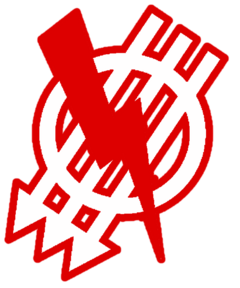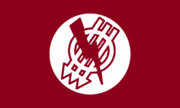Weranic Syndicalist Union: Difference between revisions
Britbong64 (talk | contribs) No edit summary |
Britbong64 (talk | contribs) No edit summary |
||
| Line 17: | Line 17: | ||
| wing1 = Revolutionäre Kampfgruppen | | wing1 = Revolutionäre Kampfgruppen | ||
| membership = 800,000 (peak) | | membership = 800,000 (peak) | ||
| ideology = {{wp|National syndicalism}}<br>{{wp| | | ideology = {{wp|National syndicalism}}<br>{{wp|Revolutionary nationalism}}<br>{{wp|Left-wing nationalism}}<br>{{wp|Anti-capitalism}}<br>{{wp|Anti-communism}}<br>{{wp|Vanguardism}} | ||
| position = {{wp| | | position = {{wp|Left wing}} | ||
| european = | | european = | ||
| international = | | international = | ||
Revision as of 22:30, 17 May 2022
Weranic Syndicalist Union Ostischer Syndikalistische Union | |
|---|---|
 | |
| Abbreviation | OSU |
| Führer-Chairman | Siegfried Höcker |
| Founded | 15 April 1914 |
| Dissolved | 24 August 1922 |
| Split from | Weranic Section of the Workers' International |
| Headquarters | Westbrucken |
| Youth wing | Syndicalist Youth |
| Armed wing | Revolutionäre Kampfgruppen |
| Membership | 800,000 (peak) |
| Ideology | National syndicalism Revolutionary nationalism Left-wing nationalism Anti-capitalism Anti-communism Vanguardism |
| Political position | Left wing |
| Colours | Red |
| Party flag | |
 | |
The Weranic Syndicalist Union (Weranian: Ostischer Syndikalistische Union) was a national syndicalist political party in Werania. Founded and led by Siegfried Höcker, the OSU was inspired by the works of the national syndicalist writer Theophilus Kellner. The OSU was founded in 1914 when it split off the Weranic Section of the Workers' International by its revolutionary-vanguardist faction who opposed the notion of a reformist direction towards socialism that the OSAI had approved at its 1914 congress in the wake of the Great Collapse. Although it was initially an orthodox-syndicalist outfit Höcker soon directed the OSU to adopt an increasingly nationalist direction, proclaiming to have formulated a "third way" between reformist socialism and capitalist democracy, claiming to be the heir of the Septemberist tradition in Weranic politics.
Following its formation the OSU quickly grew in statue due to its revolutionary rhetoric and calls to overthrow the state. The formation of the Revolutionäre Kampfgruppen (Revolutionary Combat Troops) by the OSU saw the organisation take on a paramilitary aspect, often clashing with the OSAI-affiliated Volksschutzfront and conservative Soldaten des Reichsbanners. The OSU would also position its appeal increasingly to the nationalist working class advocating the creation of a centralised dictatorship that would dismantle democracy, institute national syndicalism and purge the country both from "reactionaries" and the Nemtsovite left. It was anti-Witterite and anti-!Masonic, whilst being staunchly in favour of pan-Weranicism and lebensraum.
The OSU would gain votes at the 1915 and 1918 elections, but would fail to become a major party. Despite its large membership its incredibly violent tactics alienated potential supporters alongside its hardline rhetoric. At the 1922 election it lost support with the arrival of the National Völkisch Movement (NVB) to the political scene, with the NVB's more conventional right-wing credentials allowing it to gain support from hardline anti-socialists and ultra-nationalists.
In the political inertia that followed the 1922 elections - wherein no political majority could be found for the Volkstag - the OSU attempted to perform a coup d'état based on their vanguardist ideology with Höcker mistakenly believing a large amount of the army would support his seizure of power. The army alongside paramilitaries were able to easily defeat the attempted coup, with Höcker being arrested and the OSU being banned. Its supporters who were not arrested would largely join the NVB's paramilitary organisation (the Heimatsturmtruppen) with some later collaborating with Functionalist Gaullica during the Great War.